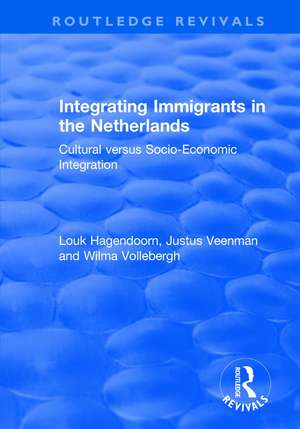Integrating Immigrants in the Netherlands: Cultural Versus Socio-Economic Integration: Routledge Revivals
Editat de Wilma Vollebergh, Justus Veenman, Louk Hagendoornen Limba Engleză Paperback – 11 noi 2019
| Toate formatele și edițiile | Preț | Express |
|---|---|---|
| Paperback (1) | 191.60 lei 43-57 zile | |
| Taylor & Francis – 11 noi 2019 | 191.60 lei 43-57 zile | |
| Hardback (1) | 680.73 lei 43-57 zile | |
| Taylor & Francis – 26 sep 2017 | 680.73 lei 43-57 zile |
Din seria Routledge Revivals
-
 Preț: 258.66 lei
Preț: 258.66 lei - 9%
 Preț: 1038.45 lei
Preț: 1038.45 lei - 9%
 Preț: 934.94 lei
Preț: 934.94 lei -
 Preț: 238.40 lei
Preț: 238.40 lei -
 Preț: 294.72 lei
Preț: 294.72 lei -
 Preț: 258.52 lei
Preț: 258.52 lei - 9%
 Preț: 903.41 lei
Preț: 903.41 lei - 18%
 Preț: 695.85 lei
Preț: 695.85 lei -
 Preț: 296.10 lei
Preț: 296.10 lei -
 Preț: 342.36 lei
Preț: 342.36 lei - 9%
 Preț: 764.28 lei
Preț: 764.28 lei -
 Preț: 317.54 lei
Preț: 317.54 lei - 9%
 Preț: 619.48 lei
Preț: 619.48 lei -
 Preț: 258.66 lei
Preț: 258.66 lei -
 Preț: 245.10 lei
Preț: 245.10 lei - 9%
 Preț: 903.80 lei
Preț: 903.80 lei - 9%
 Preț: 832.07 lei
Preț: 832.07 lei -
 Preț: 153.81 lei
Preț: 153.81 lei -
 Preț: 258.66 lei
Preț: 258.66 lei -
 Preț: 294.97 lei
Preț: 294.97 lei -
 Preț: 200.66 lei
Preț: 200.66 lei -
 Preț: 199.85 lei
Preț: 199.85 lei -
 Preț: 308.89 lei
Preț: 308.89 lei -
 Preț: 295.04 lei
Preț: 295.04 lei -
 Preț: 382.23 lei
Preț: 382.23 lei - 9%
 Preț: 606.35 lei
Preț: 606.35 lei -
 Preț: 343.21 lei
Preț: 343.21 lei -
 Preț: 258.66 lei
Preț: 258.66 lei -
 Preț: 230.80 lei
Preț: 230.80 lei - 9%
 Preț: 640.90 lei
Preț: 640.90 lei -
 Preț: 256.94 lei
Preț: 256.94 lei -
 Preț: 257.67 lei
Preț: 257.67 lei - 9%
 Preț: 801.69 lei
Preț: 801.69 lei -
 Preț: 228.88 lei
Preț: 228.88 lei -
 Preț: 259.47 lei
Preț: 259.47 lei -
 Preț: 368.93 lei
Preț: 368.93 lei - 9%
 Preț: 764.34 lei
Preț: 764.34 lei -
 Preț: 246.37 lei
Preț: 246.37 lei -
 Preț: 326.26 lei
Preț: 326.26 lei -
 Preț: 286.98 lei
Preț: 286.98 lei - 8%
 Preț: 432.15 lei
Preț: 432.15 lei -
 Preț: 258.66 lei
Preț: 258.66 lei -
 Preț: 267.15 lei
Preț: 267.15 lei -
 Preț: 295.10 lei
Preț: 295.10 lei -
 Preț: 259.68 lei
Preț: 259.68 lei - 5%
 Preț: 231.22 lei
Preț: 231.22 lei -
 Preț: 339.90 lei
Preț: 339.90 lei -
 Preț: 380.89 lei
Preț: 380.89 lei -
 Preț: 302.13 lei
Preț: 302.13 lei -
 Preț: 294.72 lei
Preț: 294.72 lei
Preț: 191.60 lei
Preț vechi: 231.20 lei
-17% Nou
Puncte Express: 287
Preț estimativ în valută:
36.66€ • 38.38$ • 30.51£
36.66€ • 38.38$ • 30.51£
Carte tipărită la comandă
Livrare economică 31 martie-14 aprilie
Preluare comenzi: 021 569.72.76
Specificații
ISBN-13: 9781138716360
ISBN-10: 1138716367
Pagini: 264
Dimensiuni: 152 x 229 mm
Greutate: 0.49 kg
Ediția:1
Editura: Taylor & Francis
Colecția Routledge
Seria Routledge Revivals
Locul publicării:Oxford, United Kingdom
ISBN-10: 1138716367
Pagini: 264
Dimensiuni: 152 x 229 mm
Greutate: 0.49 kg
Ediția:1
Editura: Taylor & Francis
Colecția Routledge
Seria Routledge Revivals
Locul publicării:Oxford, United Kingdom
Notă biografică
Wilma Vollebergh, Justus Veenman, Louk Hagendoorn
Cuprins
List of Tables, List of Figures, List of Contributors, Acknowledgements, Introduction: Cultural Orientation and Socio-Economic Integration of Immigrants in the Netherlands, 1. An International Comparison of Migration and Immigrant Policy with Respect to Immigrants from Turkey and their Participation in the Labour Market, 2. Why the Dutch Maintain More Social Distance from Some Ethnic Minorities than Others: A Model Explaining the Ethnic Hierarchy, 3. Myths and Realities of Diversity in Parenting and Parent-Child Relations: A Comparison of Indigenous and Non-Indigenous Families in the Netherlands, 4. Parenting and Adolescent Development in Dutch, Turkish and Moroccan Families in the Netherlands, 5. Normative Orientation and Academic Achievement in a School Context, 6. Acculturation, Motivation and Educational Attainment: A Contextual Model of Minority School Achievement, 7. The Ethno-Cultural and Socio-Economic Position of Ethnic Minority Groups in the Netherlands, 8. The Cultural Integration of Immigrants in the Netherlands: A Description and Explanation of Modern Attitudes of Turks, Moroccans, Surinamese, Antilleans and the Indigenous Population, Conclusion, Index
Descriere
This title was first published in 2003. Using a behaviourist and quantitative approach, this study examines the vexed questions surrounding the economic and cultural integration of immigrants into the Netherlands. The authors use the Dutch case as a specific example of a wider European problem. The book examines the two opposing theoretical and political points of view on integration, whether immigrants need to adapt to the dominant culture before they are able to fully participate in socio-economic life, or whether as they participate in socio-economic life they will gradually adapt to the dominant culture. Based primarily on quantitative research, the authors unravel the complex interrelationship between cultural and socio-economic integration.
